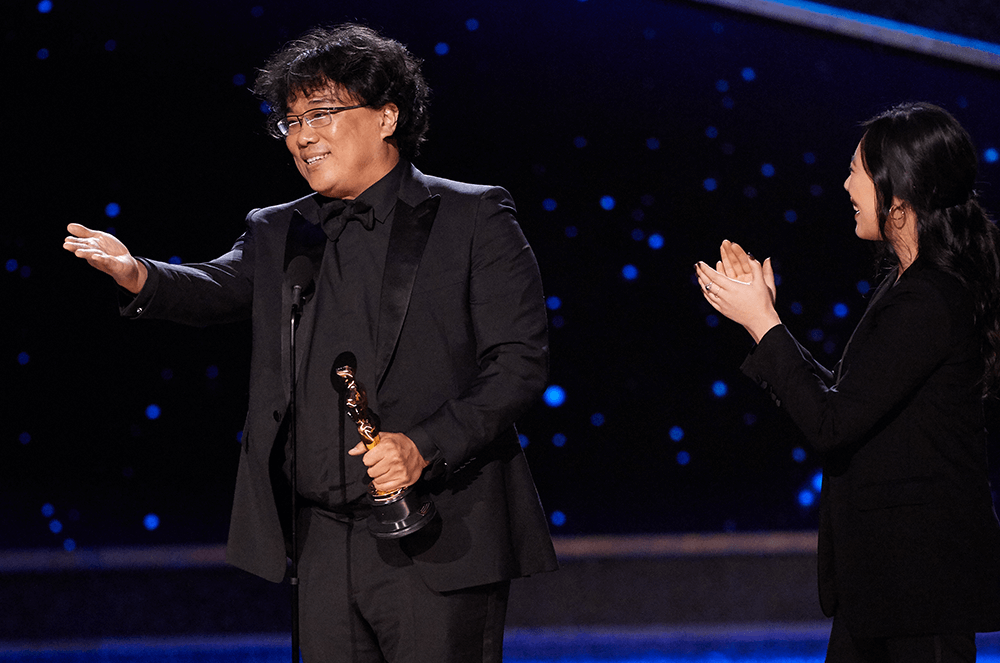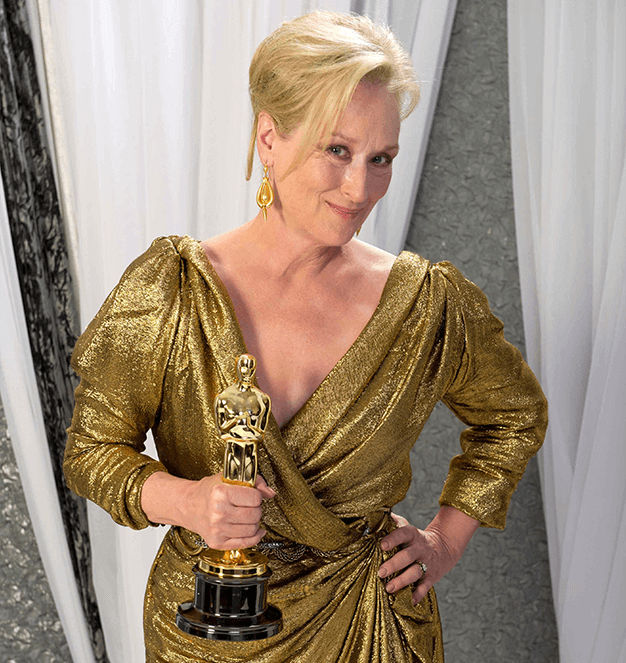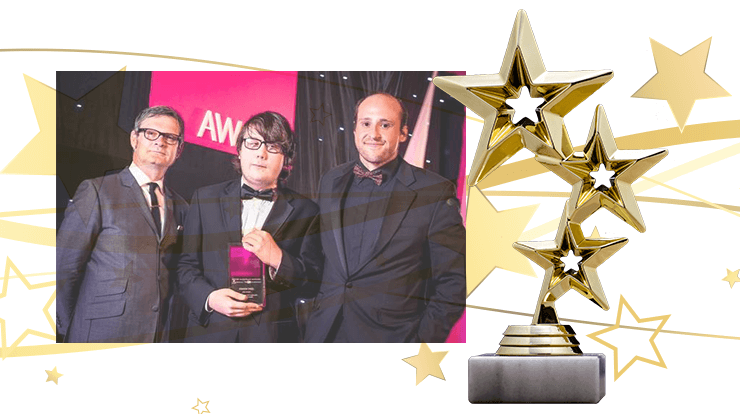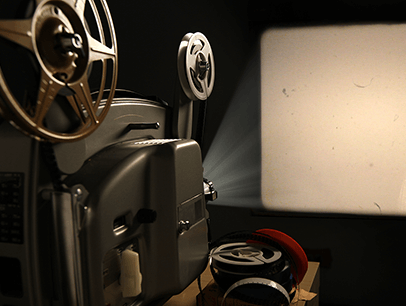 Bong Joon Ho of South Korea was named Best Director at the 2020 Academy Awards for the film Parasite. Photo of Bong Joon Ho by Blaine Ohigashi/Academy of Motion Picture Arts and Sciences.
Bong Joon Ho of South Korea was named Best Director at the 2020 Academy Awards for the film Parasite. Photo of Bong Joon Ho by Blaine Ohigashi/Academy of Motion Picture Arts and Sciences.
Read the article below and then take this quiz to test your knowledge on Academy Award speeches!
Through the years, a number of notable moments have played out onstage at the Academy Awards: crying jags (Gwyneth Paltrow upon winning the Best Actress Oscar); feats of strength (73-year-old Jack Palance hitting the floor and busting out one-armed pushups); trailblazing (Sidney Poitier becoming the first African American to win an Oscar in a lead acting category); political statements (Marlon Brando sending Native American actress Sacheen Littlefeather to decline his Oscar); and cultural statements (actress Louise Fletcher giving part of her speech in sign language for her deaf parents).
It’s a night like no other. The Academy Awards, which made its debut in 1929, is about big-name movie stars, eye-popping designer outfits, glittering gold trophies—and public speaking. It’s a unique kind of speaking, to be sure. The lucky winners who hear their names called step into the brightest of spotlights: The annual feting of the film industry is watched by millions of television viewers around the world.
For Toastmasters members, it’s particularly fun to evaluate Oscar speeches from home, listening for clarity, content, and verbal fillers. Honey, did you hear how many um’s Bradley Cooper had?! (Imagine an Ah-Counter’s exhaustion tracking the 1992 remarks of director Jonathan Demme, who was counted saying “uh” almost 40 times in the course of a five-minute winner’s address.)
The acceptance speeches are always an oratorical mix: Some winners are overwhelmed with emotion and struggle to get the words out, others bubble with irreverent jokes, and still others perform with polished grace. Some ramble past the timing signals, which in this case are not green, yellow, and red flashes but, rather, the familiar strains of the orchestra trying to play the speakers offstage.
When Julia Roberts went long in her 2001 Best Actress speech, the conductor gave his cue for the “it’s time to wrap it up” music. The actress was not having it: “And, sir, you’re doing a great job, but you’re so quick with that stick. So why don’t you sit, ‘cause I may never be here again.” Adrien Brody, in his 2003 Best Actor speech, practically pleaded with the band for more time. “One second, please. One second. Cut it out. I got one shot at this.”
With a show that often breaks the three-hour mark, winners have been asked in recent years to complete their comments in 45 seconds.
The Winner for Longest Speech …
Back in 1943, actress Greer Garson, nabbing the Best Actress award, delivered a thank-you soliloquy that reportedly stretched past seven minutes—the lengthiest Oscars speech ever—and even included a shout-out to “the doctor who delivered me!”
At the opposite end of the spectrum was Joe Pesci, who upon accepting the 1991 award for Best Supporting Actor, said, simply, “It is my privilege. Thank you.” That’s four words more than those uttered by Best Supporting Actress winner Patty Duke. Her 1963 speech in its entirety: “Thank you.”
Then there’s “the list.” As countless viewers have witnessed over the years, many winners reel off a string of names—people they want to thank for their years-long journey to the podium. The list typically includes the film’s producer, director, fellow actors (or writers or technical crew), agent, public relations people, parents, spouse, partner, children, etc. Maureen Stapleton, honored as Best Supporting Actress in 1982, covered all her bases, expressing a thank-you to “everybody I ever met in my entire life.”
The Academy of Motion Picture Arts and Sciences presented a video to all 150 award contenders before the 2006 show. Narrated by Tom Hanks, it exhorted potential winners to “lose the list” and instead be creative and witty. But though the recitation of names might bore listeners to tears, others say it’s important to issue the list of acknowledgements. No less an eminence than Meryl Streep drove that point home when she gave her 1983 Best Actress address.
 Film legend Meryl Streep thanked a long list of people in her 1983 Best Actress speech. Photo of Meryl Streep by Todd Wawrychuk/Academy of Motion Picture Arts and Sciences.
Film legend Meryl Streep thanked a long list of people in her 1983 Best Actress speech. Photo of Meryl Streep by Todd Wawrychuk/Academy of Motion Picture Arts and Sciences.“I have a lot of people to thank and I’m going to be one of those people that tries to mention a lot of names, because I know just two seconds ago my mother and father went completely berserk, and I’d like to give some other mothers and fathers that opportunity.”
An International Scene
Actors from the land that gave us Shakespeare have always added a dash of eloquence to the American proceedings. The classic thespian Laurence Olivier, presented with a Lifetime Achievement Award in 1979, waxed poetic about “the great firmament of your nation’s generosities” and “the euphoria that happens to so many of us at the first breath of the majestic glow of a new tomorrow.” Truth be told, observers later said they didn’t exactly understand the point Olivier was making—but he sure sounded good.
The regal Helen Mirren managed to deliver an acceptance speech that was both lofty and down-to-earth. She walked onstage carrying her purse in one hand, and an earring in the other, happily celebrated her “gold star,” and saluted the strength of Queen Elizabeth, whom she portrayed in The Queen.
A welcome burst of international diversity has emerged in recent years. The Academy Awards has long had a category for “Best Foreign Film,” but a number of filmmakers from other countries have also won in mainstream categories. From 2013 to 2018, five of the six Best Director awards went to a Mexican filmmaker: Alejandro González Iñárritu (twice), Guillermo del Toro, and Alfonso Cuarón (twice). In 2020, the South Korean director Bong Joon Ho captured the prize for the film Parasite, which was also honored for Best Picture.
Grace Under Pressure
One of the things a Toastmaster learns is to be in the moment when speaking. If something spontaneously happens and the audience reacts, it’s better to acknowledge the situation than ignore it. If possible, use humor. Oscar winner Jennifer Lawrence gracefully handled just such a moment. On her walk to accept the 2013 award for Best Actress, she tripped on the first step to the stage.
Taking the golden statue and receiving a standing ovation, she quipped, “You guys are just standing up because you feel bad that I fell. That’s really embarrassing.”
An even bigger stumble occurred in 2017, in the ceremony’s climactic moment. Film legends Warren Beatty and Faye Dunaway were presenting the award for Best Picture. The Oscar went to the musical La La Land. Except it didn’t.
Beatty had accidentally been handed the wrong envelope. As the La La Land team exulted onstage, the error was frantically pieced together: The actual winner of the award was Moonlight. La La Land producer Jordan Horowitz—having just given his acceptance speech!—met the moment. He promptly stepped back to the microphone and called on his competitors to accept their rightful prize.
“Moonlight, you guys won best picture,” he said, even holding up the correct winner’s card to erase any doubts. “This is not a joke, come up here.”
Though the makers of Moonlight scored the big victory of the night, Horowitz won high praise for his gracious handling of the epic flub.
It was a classic Hollywood ending: suspense, drama, and a heroic save.
Paul Sterman is senior editor, executive and editorial content, for Toastmasters International. Reach him at psterman@toastmasters.org.
Related Articles

Personal Growth
How to Accept an Award

Funny You Should Say That
A Word on Awards

Personal Growth



 Previous
Previous
 Previous Article
Previous Article
